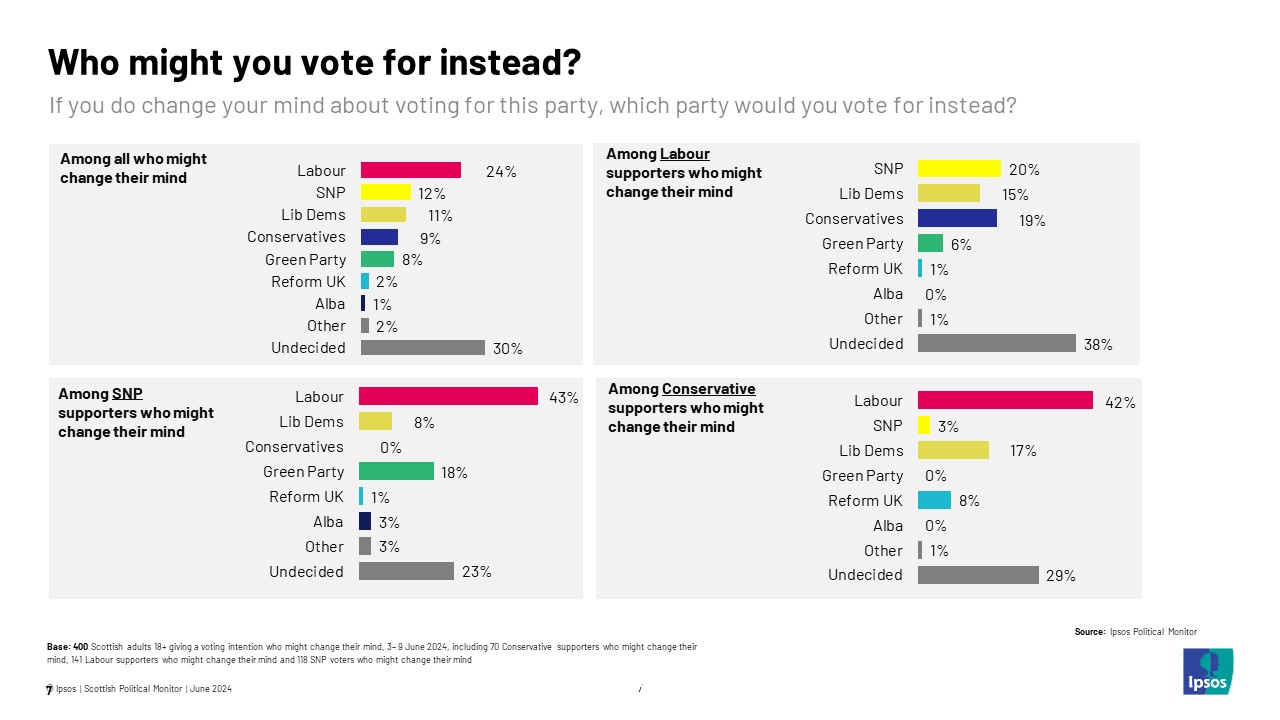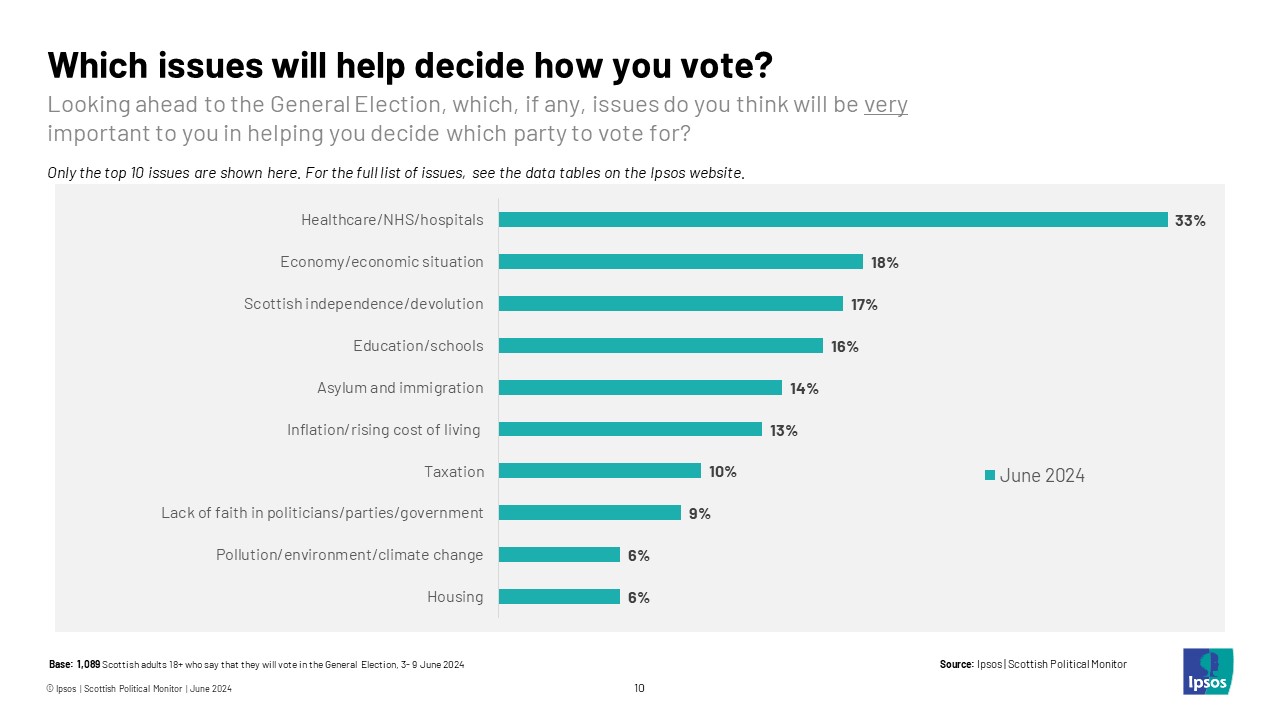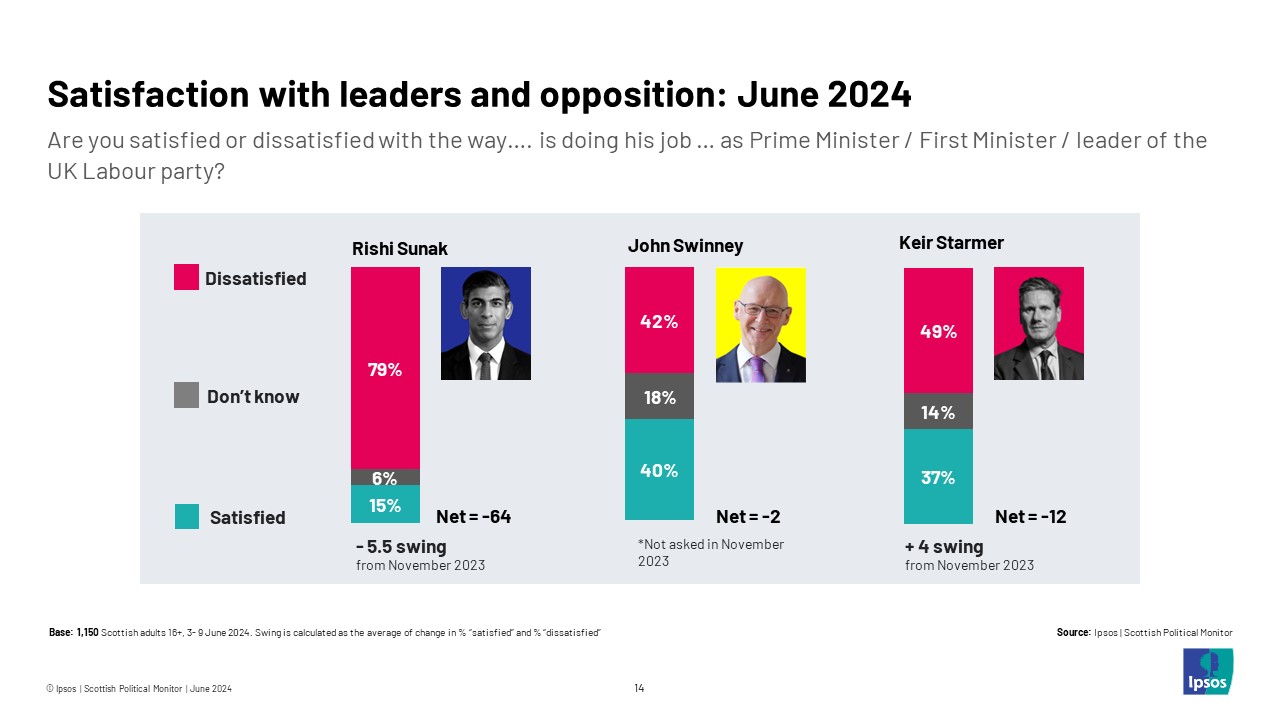Labour strengthens position in Scotland as Ipsos poll shows a close race
- First Ipsos poll since the General Election was called puts Labour and the SNP neck and neck on 36% of the vote each
- 42% of likely voters may still change their mind
- The NHS is the top issue for Scottish voters
Voting intention in Scotland
Ipsos’ first Scotland poll since the General Election was called, taken 3rd to 9th June 2024, indicates a very close race between the SNP and Labour in Scotland when it comes to voting intention, with both parties on 36% of the vote. Our headline estimate of General Election voting intention is:
- SNP: 36% (-3 compared with our last poll of 25th-31st January)
- Labour: 36% (+4)
- Conservatives: 13% (-1)
- Liberal Democrats: 5% (-1)
- Reform UK: 4% (+1)
- Scottish Green Party: 3% (-1)
- Alba Party: 1% (unchanged)
- Other: 1% (+1)
Have voters made up their minds?
55% of voters say they have definitely decided which party to vote for, while 42% say they may still change their mind before polling day. Those who say they’ll vote SNP or Labour are surer of their vote than those who say they’ll vote Conservative: 63% of SNP supporters and 55% of Labour supporters say they’ve definitely decided, compared with 43% of Conservative supporters.
Among those who may change their mind, 24% say they may switch to Labour, 12% to the SNP, 11% to the Liberal Democrats, 9% to the Conservatives and 8% to the Greens.

Tactical voting
Just under a quarter (23%) of those saying they would vote for a party say they are doing so to try and keep another party out in their constituency, rather than because it is the party they most prefer. This is a 10-point increase in likely tactical voting compared with Ipsos’ poll in the run-up to the 2019 General Election, when just 13% said they were voting to keep another party out. The likelihood of tactical voting is higher among those who intend to vote Labour (34%) or Conservative (27%) than among those who intend to vote SNP (11%).
Key issues
The NHS is the number one issue impacting people’s vote. 33% say this is a very important issue which will help them decide which party to vote for, followed by the economy (18%), Scottish independence/devolution (17%) and education (16%). These are followed by immigration (14%) and the cost of living (13%).

Among potential voters in Scotland, 39% expect they’ll vote mostly according to what is going on in Britain as a whole, while 33% say they’ll vote mostly according to what is going on in Scotland, and 27% say they’ll vote according to both equally. Those who currently intend to vote SNP are more likely to say they’ll vote mostly according to what’s going on in Scotland (49%), while those intending to vote Labour or Conservative are more likely to say they’ll vote mostly according to what’s going on in Britain as a whole (49% and 55% respectively).
Trust in the parties
There is little to choose between Labour and the SNP when it comes to public trust in the parties to handle public services. On the NHS, the issue that matters most to potential voters, 30% trust Labour most while 29% trust the SNP most. On education, 29% trust the SNP most and 28% trust Labour most.
The SNP are a little more trusted than Labour on growing Scotland’s economy (31% trust the SNP most, while 27% trust Labour most), while Labour enjoy higher trust than the SNP when it comes to tackling the cost of living crisis (31% trust Labour most, while 26% trust the SNP most). The SNP are the most trusted party to stand up for Scotland’s interests – 43% of the public say they trust the SNP most to do this, double the proportion who say the same of Labour (21%).
Party leaders
None of the party leaders asked about in Ipsos’ poll receives a positive net approval rating from the public. The public are split both on First Minister John Swinney (40% say they are satisfied with the way he is doing his job, while 42% are dissatisfied – a net approval rating of -2) and on Scottish Labour leader Anas Sarwar (38% are satisfied and 39% dissatisfied – a net approval rating of -1). Douglas Ross, who has said he will stand down as Scottish Conservative leader, fares more poorly, with a net approval rating of -29 (27% satisfied, 56% dissatisfied).
Rishi Sunak remains very unpopular in Scotland, with a net rating of -64: just 15% are satisfied with him, while 79% are dissatisfied. This is a lower net rating than the Scottish public gave Boris Johnson ahead of the 2019 general election (-52). The Scottish public remain lukewarm on Keir Starmer, who receives a net approval rating of -12: 37% are satisfied with him, while 49% are dissatisfied. However, over half (53%) say that Starmer would be the most capable of the two as Prime Minister, while just 16% say the same of Sunak, and 24% that neither of them would be most capable.

Scottish Independence
The poll shows a small lead for Yes, down 2 percentage points compared with Ipsos’ previous poll in January. Among those likely to vote either Yes or No in an immediate referendum, 51% say they would vote Yes and 49% No.
Emily Gray, Managing Director of Ipsos in Scotland, commented:
This election campaign in Scotland is about the persuadables, with 42% of likely voters saying they may change their mind by polling day. Although it currently looks a very close race between the SNP and Labour, there are signs that Labour may be in a stronger position than the SNP to win further voters over during the campaign. Of those who may change their minds, Labour is likely to be the main beneficiary, with 24% of this group saying they may switch to Labour, compared with 12% for the SNP. The Conservative vote looks soft, with 55% of those intending to vote Conservative saying they may change their mind – and those voters would be most likely to switch to Labour. Given the profile of marginal seats in Scotland, even small changes in vote share (and remember that polls have a margin of error too) can make a big difference to the final result – which means the parties still have a huge amount to play for in the remaining weeks of the campaign.
Technical note
- Ipsos interviewed a representative sample of 1,150 adults aged 16+ across Scotland.
- Interviews were conducted by telephone from 3– 9 June 2024.
- Data are weighted to the profile of the population.
- Where results do not sum to 100%, this may be due to computer rounding, multiple responses, or the exclusion of “don’t know” categories.
- For General Election voting intention, a two-part question is used with prompting on major parties (Conservatives, Labour, Liberal Democrats, Scottish National Party or another party – if a respondent says they would vote for another party we ask which party that would be) and a follow-up “squeeze” question of those who were undecided or refused to the first question. Only those aged 18 and above are asked the voting intention questions. A turnout filter is used based on two questions (current stated likelihood to vote and previous voting behaviour). The headline voting intention figures in this poll are based on the 64% of respondents aged 18+ who give a voting intention and pass this turnout filter.
- Filtering on only those registered to vote makes no significant difference to headline voting intention (37% Labour, 36% SNP, 13% Conservative, 5% Liberal Democrat, 4% Reform UK, 3% Scottish Green Party, 1% Alba Party, 1% Other). As the registration deadline is still open our headline figure is not based on only those registered to vote.
- All polls are subject to a wide range of potential sources of error. On the basis of the historical record of the polls at recent general elections, there is a 9 in 10 chance that the true value of a party’s support lies within 4 points of the estimates provided by this poll, and a 2 in 3 chance that they lie within 2 points. This is especially important to keep in mind when calculating party lead figures.
- With the start of the election campaign, we have updated our weighting targets to use the most up-to-date reliable figures. This has minimal impact to our headline voting intention figures, well within the margin of error, with all changes less than 0.25 percentage points.



